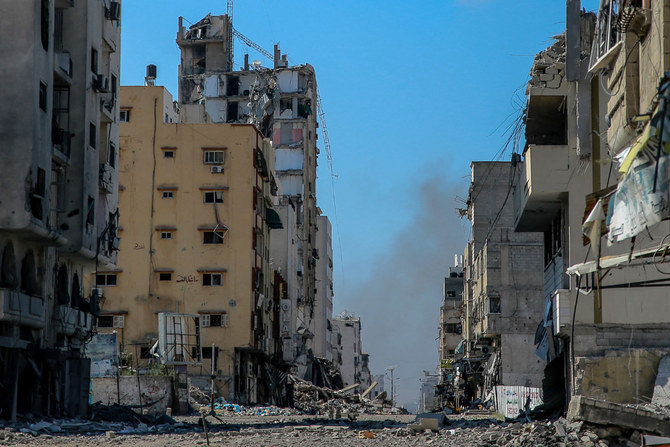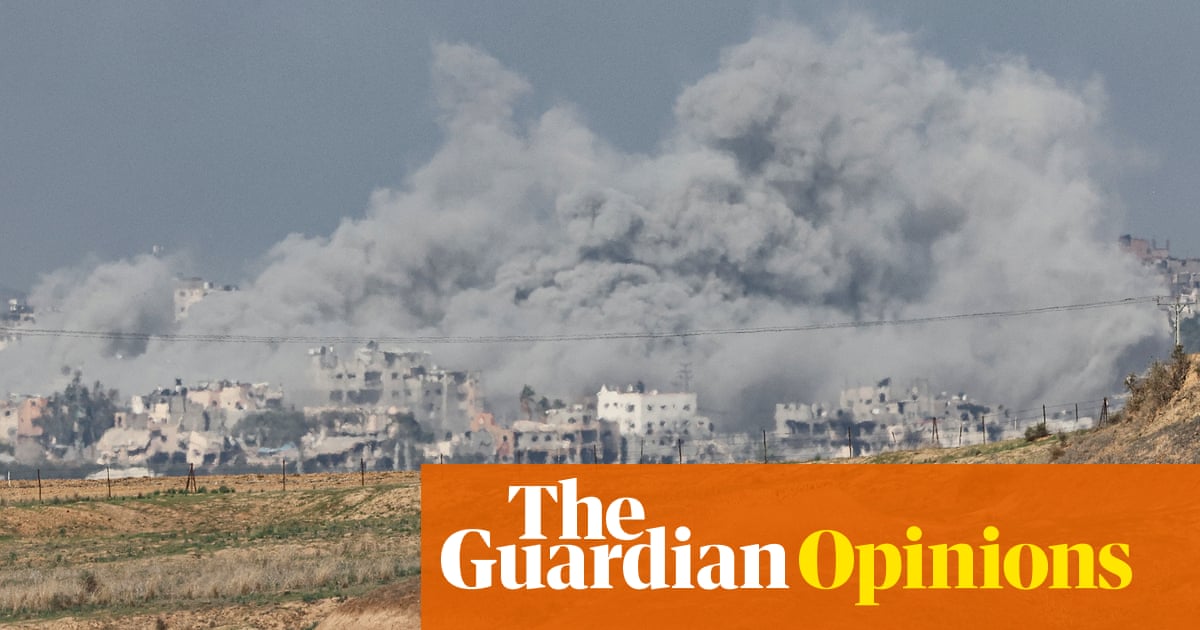
Two terms have entered the lexicon in dealing with Palestine this year, both of which should chill all but the most heartless — genocide and famine. Israel now stands accused of bringing about both. It is the International Court of Justice that is putting it on trial for the former.
As for the latter, it was the Integrated Food-Security Phase Classification that released its determination last week that Gaza was on the brink of famine. This famine is purely man-made.
One has to wonder, after all the apocalyptic scenes of rubble, destruction and death the world has seen day after day for nearly six months, if images of babies and toddlers being starved to death will prick the conscience of Western governments? Will there finally be some meaningful action to stop the horror?
A ceasefire may or may not ensue in the coming days or weeks. Hope on this front is minimal. The gaps between the Israeli leadership and Hamas inside Gaza remain too wide. Israeli Prime Minister Benjamin Netanyahu alone is determined to continue to the most bitter of ends, refusing any opportunity for a period of calm for his array of domestic opponents to take him down. Hamas wants the ceasefire to be permanent, while Netanyahu wants just a pause. The hostages held in Gaza are just pawns in all of this, as are Palestinian civilians in Gaza.
What should major powers do? The US has considerable options, but a hesitant President Joe Biden is unwilling, it seems, to do more than let it be known how angry he is with the Israeli leader.
American inaction should be no excuse for other actors. Many have been hiding behind Washington’s coattails on this, arguing that unless the US takes action, their efforts will be meaningless.
This is just a lame cop-out. European states, Canada, Australia, and Japan can all do far more, and their warm trade links with Israel offer them leverage if deployed. China and Russia, fresh from vetoing a UN Security Council draft resolution, could also be more effective, but they have their own agendas and priorities.
The hostages held in Gaza are pawns in all of this, as are Palestinian civilians.
Chris Doyle
The bare minimum requirement of major donor states is to reverse the nonsensical and immoral suspension of funding to UNRWA. The Israeli government has utterly failed to provide evidence for its allegations against UNRWA staff, who in any event have already been fired. Thankfully, many states have already made this move. The EU partially restarted aid to URWA by releasing €50 million ($55 million) out of €84 million allocated for 2024. Australia, Denmark, Finland, Sweden, Canada. Slovenia, Ireland, Spain, Norway, and Portugal have announced extra support for UNRWA.
Yet Israel continues its games with UNRWA. It has denied entry to Philippe Lazzarini, the agency’s head. Twice in the past week Israel has denied access to an UNRWA food convoy trying to deliver aid to the north of Gaza.
Donors can also divert their energies from the airdrops that are little more than dangerous, ineffective showboating, and press Israel to open more border crossings and for longer hours. Gaza has seven border crossings, but only two are operational.
Israel is not going to stop blocking aid unless such states demonstrate that consequences will follow. The EU has plenty of tools. It did finally impose sanctions on settlers a week ago. These can be expanded. Why should extremist settler organizations such as Regavim or Elad be allowed to raise funds even market properties in illegal settlements in Europe and elsewhere? The policy of distinguishing between Israel and the Occupied Territories, as demanded in UN Security Council Resolution 2334, must be hardened. There should be zero institutional link ups with settlement universities for example.
Arguably the most effective measure would be a full and total ban on all trade with Israeli settlements. It would be timely given that Israel has been busy using the Gaza horror show to steal more land. As US Secretary of State Antony Blinken arrived in Israel, officials announced the largest single seizure of Palestinian land in the West Bank since 1993.
The EU could also suspend its neighborhood agreement with Israel. The agreement has a human rights clause, bizarrely never invoked given Israel’s appalling human rights record, that would allow the EU to suspend the agreement. This would end all trade preferences for Israeli goods in the EU market.
If other arms exporters ended this trade, it would send a powerful signal.
Chris Doyle
What about a ban or suspension of arms sales to Israel? Canada announced this last week, joining the Netherlands, Japan, Spain, and Belgium. It was even reported that this was not off the table for the US. That is less likely, but if other arms exporters ended this trade, it would send a powerful signal, but more importantly bring them into line with international law, as such trade should not be happening with a state that is on trial at the International Court of Justice for genocide, and whose openly stated policy of denying food and water to Palestinians in Gaza is leading to famine. Israel has more than enough capabilities to defend itself, but denying extra weaponry could impinge on its ability to continue its war criminal onslaught.
Is any of this possible? Some welcome signs of a change of approach are appearing, like spring flowers nervously popping their heads above ground.
The British position has hitherto been very sympathetic to Israel. Yet, the Foreign Secretary, David Cameron, wrote a letter last week containing the staunchest criticisms yet of Israel’s conduct in Gaza. He made clear Israel was to blame for blocking aid. “The main blockers remain arbitrary denials by the government of Israel and lengthy clearance procedures, including multiple screenings and narrow opening windows in daylight hours.” Cameron also confirmed, contrary to Israeli claims, “that the UN has not requested that the Kerem Shalom crossing is closed on Saturdays. It is our understanding that Israel closes it due to the Sabbath.”
Earlier comments on social media from Cameron blaming Israel for blocking aid into Gaza led to an Israeli official challenging this, repeating the blatant lie that there are “no limits of food, water, medicines or shelter equipment into Gaza.” Further to British complaints, that spokesperson was suspended. Quite what happened is not clear, but Cameron was not happy.
Britain has subtly changed some key positions. Ministers now state Israel has to adhere to the provisional measures the ICJ ordered it to comply with. The UK has also made clear that Europe is considering withholding weapons from Israel if it does not grant the International Committee of the Red Cross access to Palestinians seized in Gaza and now detained in Israel.
Mini-steps will not cut it. If genocide and man-made famine are genuinely seen by leaderships as atrocities, today, not tomorrow, is the moment for drastic action.
• Chris Doyle is director of the Council for Arab-British Understanding in London.
X: @Doylech










